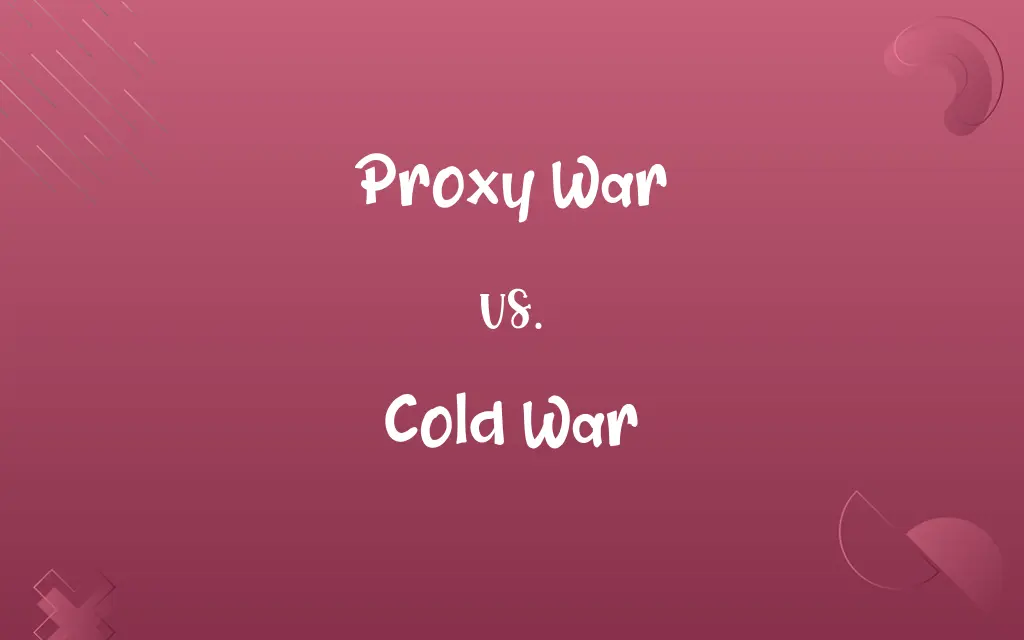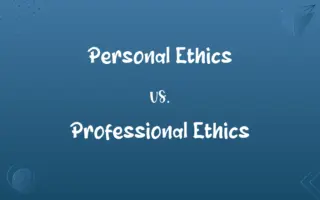Proxy War vs. Cold War: Know the Difference

By Shumaila Saeed || Updated on December 25, 2023
A Proxy War is a conflict between two powers using third parties, whereas the Cold War was a period of geopolitical tension without direct warfare.

Key Differences
Proxy Wars involve major powers supporting, training, or financing smaller groups or nations to fight on their behalf. The Cold War, a prolonged period of tension between the US and the Soviet Union, was marked by ideological and political rivalry without direct military confrontation.
Shumaila Saeed
Dec 10, 2023
In a Proxy War, the involved superpowers avoid direct conflict to reduce the risk of a larger war. During the Cold War, the US and USSR engaged in various Proxy Wars as a means of exerting influence without engaging in direct warfare.
Shumaila Saeed
Dec 10, 2023
Proxy Wars are often fought in third-party countries, with the backing of major powers for strategic advantages. The Cold War, conversely, was characterized by nuclear arms races, espionage, and the spread of propaganda rather than direct military engagement.
Shumaila Saeed
Dec 10, 2023
The objectives of Proxy Wars are to achieve geopolitical goals indirectly. The Cold War was a struggle for global supremacy between two superpowers, influencing international politics and leading to numerous Proxy Wars.
Shumaila Saeed
Dec 10, 2023
Proxy Wars can be seen as an extension of the policies of larger powers, often reflecting their interests. The Cold War, however, was a unique period where global politics were dominated by the rivalry between the US and the Soviet Union, impacting various aspects of international relations.
Shumaila Saeed
Dec 10, 2023
ADVERTISEMENT
Comparison Chart
Nature of Conflict
Indirect, fought through third parties
Direct tension between superpowers, no combat
Shumaila Saeed
Dec 10, 2023
Involvement
Superpowers support proxies but don’t engage directly
Superpowers engage in rivalry without direct military conflict
Shumaila Saeed
Dec 10, 2023
Typical Locations
Often in third-party countries
Global, but without specific battlefields
Shumaila Saeed
Dec 10, 2023
Goals
To achieve strategic objectives indirectly
To exert ideological and political dominance without warfare
Shumaila Saeed
Dec 10, 2023
ADVERTISEMENT
Proxy War and Cold War Definitions
Proxy War
An indirect way for nations to exert influence without direct conflict.
In the Syrian conflict, various nations engaged in a Proxy War by supporting different factions.
Shumaila Saeed
Dec 04, 2023
Cold War
A state of political and military tension following World War II.
The Berlin Airlift was a significant event during the Cold War, showcasing US-Soviet tensions.
Shumaila Saeed
Dec 04, 2023
Proxy War
A war where superpowers avoid direct engagement, using surrogates instead.
The Soviet-Afghan War was a Proxy War with the US supporting Afghan mujahideen against Soviet forces.
Shumaila Saeed
Dec 04, 2023
Cold War
A period marked by nuclear arms races and ideological battles.
The Cuban Missile Crisis was a critical moment in the Cold War, highlighting the nuclear standoff.
Shumaila Saeed
Dec 04, 2023
Proxy War
A conflict where major powers use third parties to fight on their behalf.
The Vietnam War was a Proxy War with the US and Soviet Union backing opposing sides.
Shumaila Saeed
Dec 04, 2023
ADVERTISEMENT
Cold War
A period of geopolitical tension between superpowers without direct military confrontation.
The Cold War era was defined by the ideological conflict between the US and the Soviet Union.
Shumaila Saeed
Dec 04, 2023
Proxy War
A conflict representing larger global tensions between major powers.
The Angola Civil War became a Proxy War with Soviet and US-backed factions fighting for control.
Shumaila Saeed
Dec 04, 2023
Cold War
Characterized by espionage, propaganda, and indirect conflicts.
During the Cold War, the space race was a significant aspect of the US-Soviet rivalry.
Shumaila Saeed
Dec 04, 2023
Proxy War
A strategy where larger powers achieve geopolitical goals through smaller allies.
The US's involvement in the Korean War was part of a Proxy War against Communist expansion.
Shumaila Saeed
Dec 04, 2023
Cold War
A time of global influence struggles without open warfare.
The Cold War influenced many international policies and conflicts without leading to a world war.
Shumaila Saeed
Dec 04, 2023
Repeatedly Asked Queries
What are the consequences of proxy wars?
Proxy wars often result in significant loss of life and instability in the region where they occur.
Shumaila Saeed
Dec 10, 2023
Why do countries engage in proxy wars?
Nations use proxy wars to achieve their objectives without direct confrontation, reducing the risk of escalation.
Shumaila Saeed
Dec 10, 2023
Can a proxy war lead to a larger conflict?
Yes, proxy wars can escalate into larger conflicts if the involved superpowers become directly involved.
Shumaila Saeed
Dec 10, 2023
What is a proxy war?
A proxy war is a conflict where two or more opposing powers use third-party forces to fight on their behalf.
Shumaila Saeed
Dec 10, 2023
What is the Cold War?
The Cold War was a period of geopolitical tension and rivalry between the United States and the Soviet Union and their respective allies from the end of World War II until the early 1990s.
Shumaila Saeed
Dec 10, 2023
Why is it called the "Cold" War?
It's called the Cold War because it was characterized by political and military rivalry without direct armed conflict between the two superpowers.
Shumaila Saeed
Dec 10, 2023
When did the Cold War officially end?
The Cold War officially ended with the dissolution of the Soviet Union in 1991 and the subsequent collapse of the Eastern Bloc.
Shumaila Saeed
Dec 10, 2023
What was the significance of the Marshall Plan during the Cold War?
The Marshall Plan was a U.S. initiative that provided economic aid to help rebuild Western Europe after World War II, and it played a role in containing the spread of communism.
Shumaila Saeed
Dec 10, 2023
Give an example of a proxy war.
The Vietnam War (1955-1975) was a notable proxy war between the United States (supporting South Vietnam) and the Soviet Union (supporting North Vietnam).
Shumaila Saeed
Dec 10, 2023
Did the Cold War lead to any proxy wars?
Yes, the Cold War era saw several proxy wars, including the Korean War, Vietnam War, and conflicts in Africa and Latin America.
Shumaila Saeed
Dec 10, 2023
What were the main causes of the Cold War?
Ideological differences, competition for global influence, and the development of nuclear weapons were key causes.
Shumaila Saeed
Dec 10, 2023
What were some notable events during the Cold War?
The Cuban Missile Crisis, the Korean War, and the construction of the Berlin Wall were significant Cold War events.
Shumaila Saeed
Dec 10, 2023
Who were the major leaders of the U.S. and the Soviet Union during the Cold War?
Key figures included U.S. Presidents Truman, Eisenhower, Kennedy, and Reagan, and Soviet leaders Stalin, Khrushchev, and Gorbachev.
Shumaila Saeed
Dec 10, 2023
Did the Cold War have any lasting impacts?
Yes, it shaped international relations, led to the arms race, and influenced post-World War II geopolitics.
Shumaila Saeed
Dec 10, 2023
What was the policy of containment during the Cold War?
The containment policy aimed to prevent the spread of communism, primarily by providing economic and military aid to countries threatened by communism.
Shumaila Saeed
Dec 10, 2023
Share this page
Link for your blog / website
HTML
Link to share via messenger
About Author
Written by
Shumaila SaeedShumaila Saeed, an expert content creator with 6 years of experience, specializes in distilling complex topics into easily digestible comparisons, shining a light on the nuances that both inform and educate readers with clarity and accuracy.

































































